Unit 4 Pygmalion Learning about Language 课件(24张PPT)
文档属性
| 名称 | Unit 4 Pygmalion Learning about Language 课件(24张PPT) | 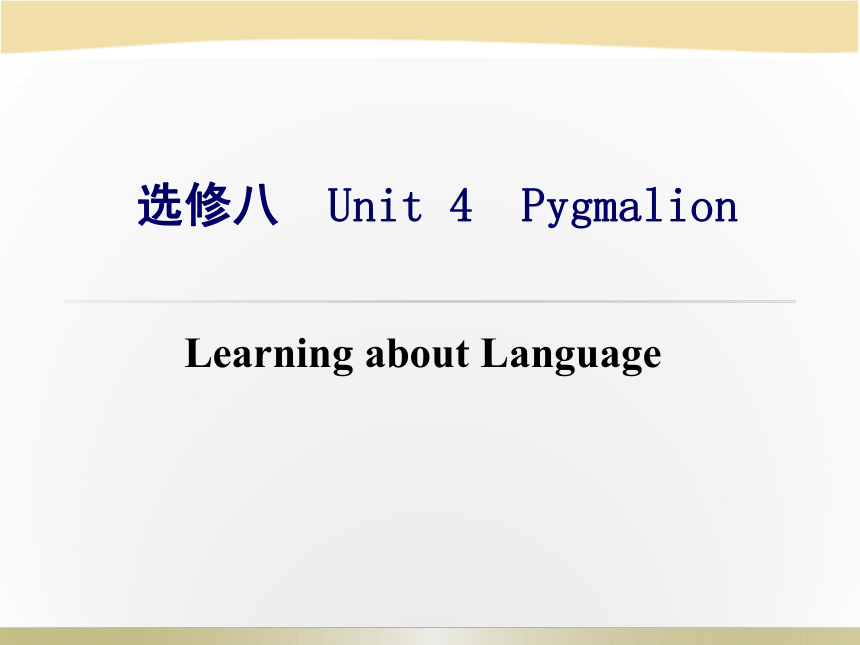 | |
| 格式 | zip | ||
| 文件大小 | 1.2MB | ||
| 资源类型 | 教案 | ||
| 版本资源 | 人教版(新课程标准) | ||
| 科目 | 英语 | ||
| 更新时间 | 2020-04-22 16:42:55 | ||
图片预览

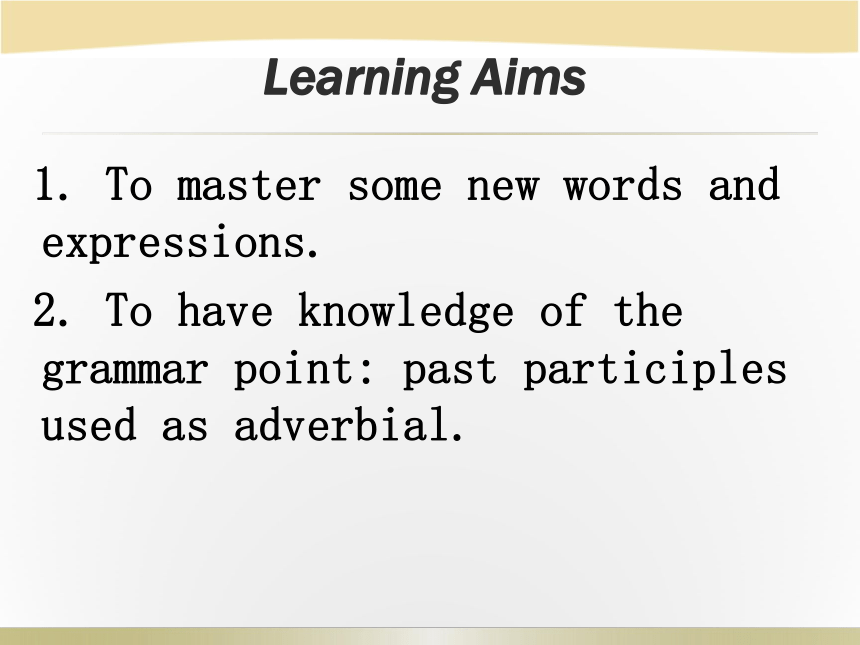
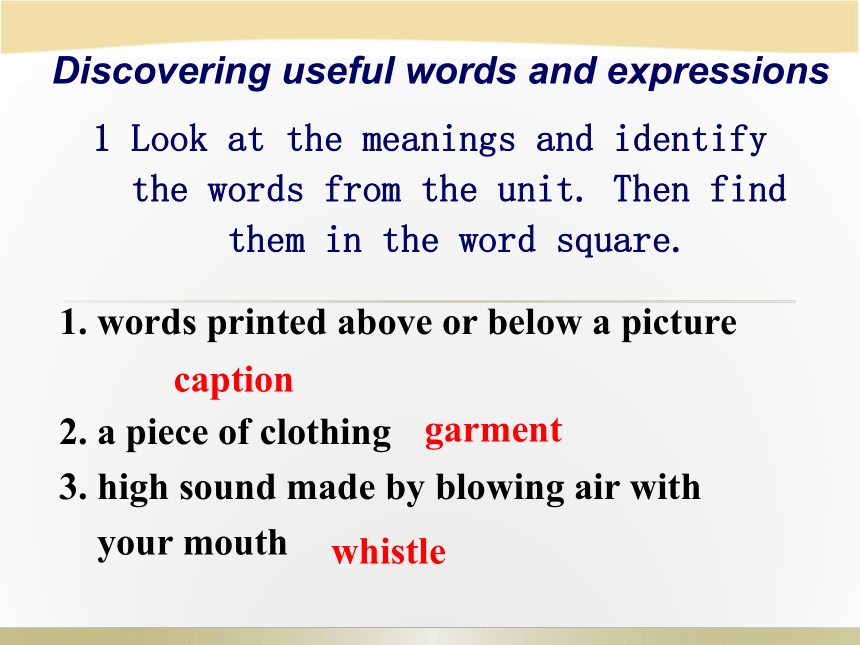
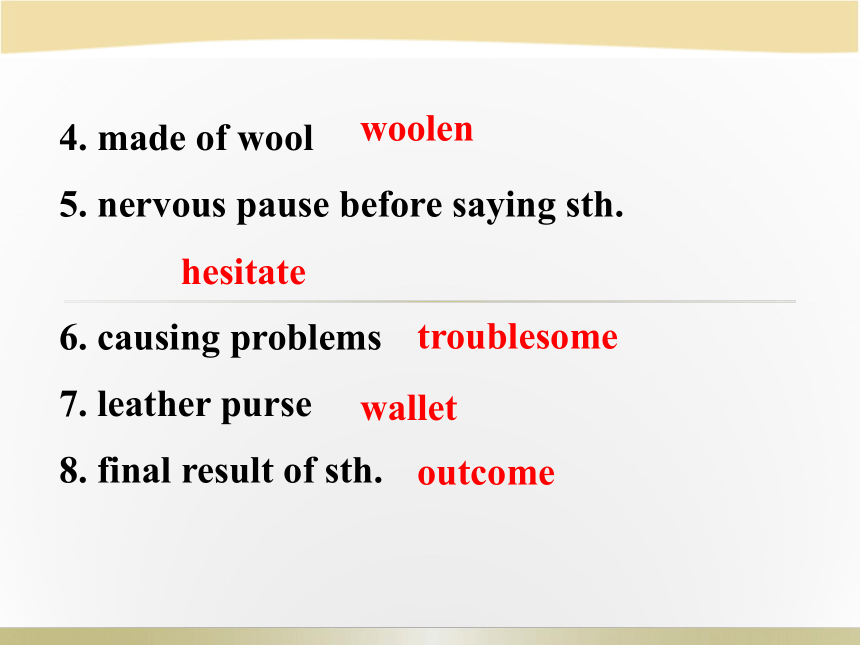
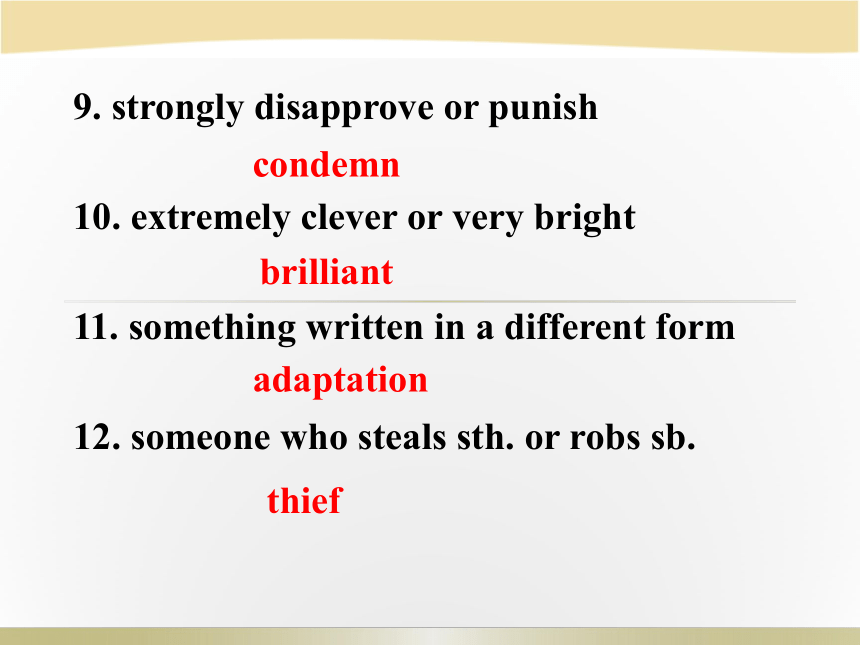
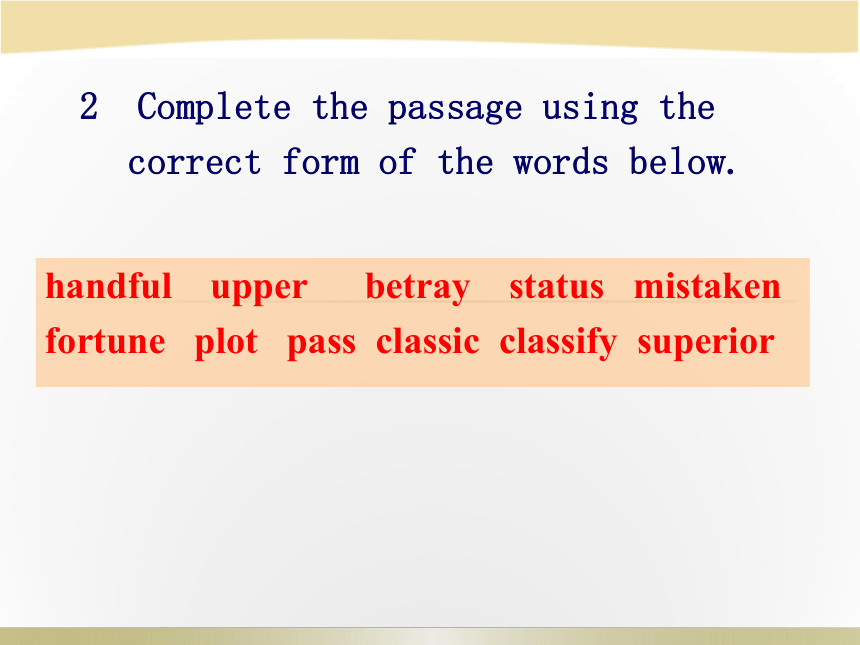
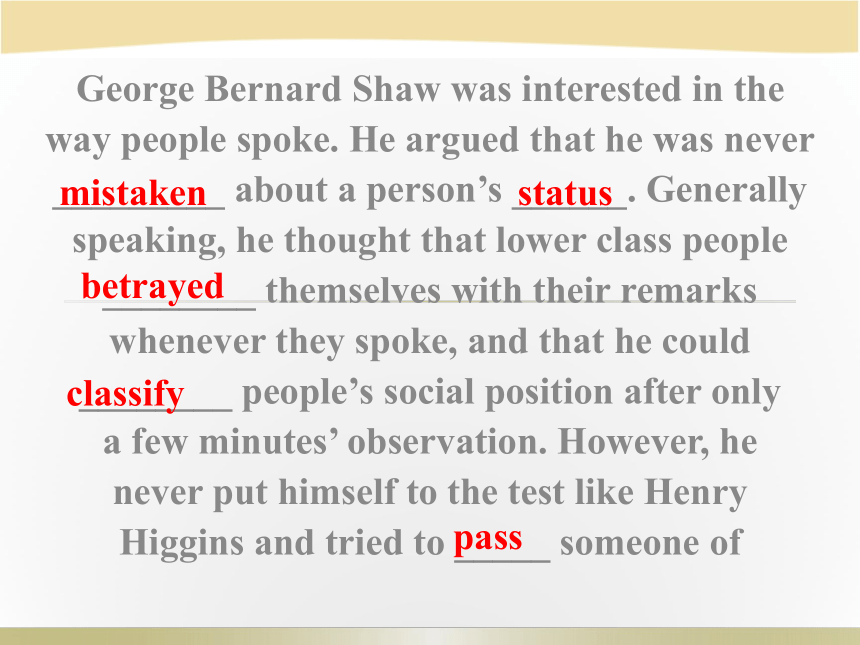
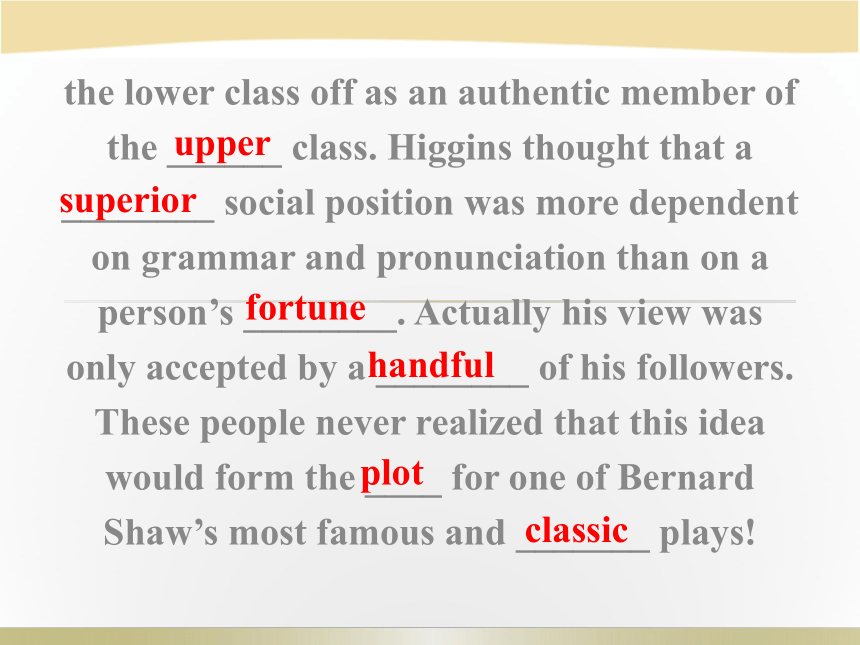
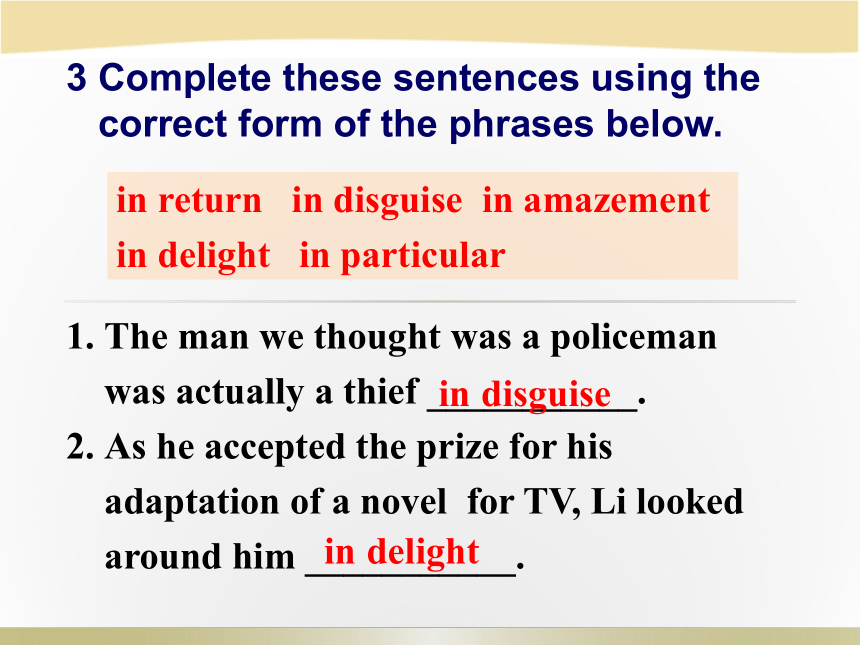
文档简介
(共24张PPT)
选修八 Unit 4 Pygmalion
Learning about Language
Learning Aims
1. To master some new words and expressions.
2. To have knowledge of the grammar point: past participles used as adverbial.
1 Look at the meanings and identify
the words from the unit. Then find
them in the word square.
Discovering useful words and expressions
1. words printed above or below a picture
2. a piece of clothing
3. high sound made by blowing air with
your mouth
caption
garment
whistle
4. made of wool
5. nervous pause before saying sth.
6. causing problems
7. leather purse
8. final result of sth.
woolen
hesitate
troublesome
wallet
outcome
9. strongly disapprove or punish
10. extremely clever or very bright
11. something written in a different form
12. someone who steals sth. or robs sb.
condemn
brilliant
adaptation
thief
2 Complete the passage using the
correct form of the words below.
handful upper betray status mistaken
fortune plot pass classic classify superior
George Bernard Shaw was interested in the
way people spoke. He argued that he was never
_________ about a person’s ______. Generally
speaking, he thought that lower class people
________ themselves with their remarks
whenever they spoke, and that he could
________ people’s social position after only
a few minutes’ observation. However, he
never put himself to the test like Henry
Higgins and tried to _____ someone of
mistaken
status
betrayed
classify
pass
the lower class off as an authentic member of
the ______ class. Higgins thought that a
________ social position was more dependent
on grammar and pronunciation than on a
person’s ________. Actually his view was
only accepted by a ________ of his followers.
These people never realized that this idea
would form the ____ for one of Bernard
Shaw’s most famous and _______ plays!
upper
superior
fortune
handful
classic
plot
in return in disguise in amazement
in delight in particular
1. The man we thought was a policeman
was actually a thief ___________.
2. As he accepted the prize for his
adaptation of a novel for TV, Li looked
around him ___________.
in disguise
in delight
3 Complete these sentences using the
correct form of the phrases below.
3. She stared at the priceless antique ring
_____________.
4. It was such a wonderful play – I enjoyed
the music ____________.
5. He gave me a musical box at my birthday
party and I gave him a wonderful new coat
__________.
in return
in amazement
in particular
Grammar
Revise the Past Participle
as Adverbial
过去分词短语做状语可表示时间、地点、原因、
条件、让步、伴随等意义。这种过去分词状语
相当于一个时间、地点、原因、条件、让步等
状语从句, 若过去分词作状语, 句子的主语与
分词所表示的动作构成动宾关系, 即是该分词
动作的承受者。
过去分词(短语)作状语时, 也可在其前面加上
连词 when, if, once, though, unless等, 以便明确
作何种状语。
从山顶上看, 这个城市就像一个大花园。
__________________________ ,?the?city?
looked?like?a?big?garden.
入党以后, 他决定献身于党的事业。
_____________________, he?decided?to?
devote?his?life?to?the?cause?of?the?Party.
1. 表时间, 相当于一个时间状语从句, 有时过去
分词前可加连词when或while来强调时间概念。
Seen?from?the?top?of?the?hill
Accepted?by?the?Party
2. 表原因, 相当于一个原因状语从句。如:
激动的人们被那个故事深深地感动了, 停止了争吵。
________________________, the?excited young?
people?stopped arguing.? 3. 表条件, 相当于一个条件状语从句, 有时过去
分词前可用if 等词。如:
再给他一次机会, 他会做得更好。
______________________________________
Encouraged?by?the?speech
Given?another?chance,?he?will?do?it better.
和你哥哥相比, 你应该更加努力学习英语。
__________________________,?you?should?
make?greater?efforts?to?study?English.
水如果被加热, 会变成水蒸气。 ?_________, water?can?be?turned?into?steam.
Compared?with?your?brother
If?heated
4. 表让步, 相当于一个though/although引导
的让步状语从句。如:
尽管已经跑得筋疲力尽, 他们还是继续追赶
着那个强盗。
_________________________,?they?went?on?
running?after?the?robber.?
尽管被许多人嘲笑, 他还是继续他的研究。
____________________________________
___________________
Exhausted?by?the running
Laughed?at?by?many?people,?he?continued
his?study.
5. 表方式或伴随情况。如:
那个老人在他的妻子的搀扶下走进了房间。
The?old?man?went?into?the?room,?
______________________.
我和父亲坐在桌子旁边讨论着我的工作问题。
__________________,?my?father?and?I?
were?talking?about?my?job.?
supported?by?his?wife
Seated?at?the?table
提示:
过去分词作状语与现在分词作状语的区别在于:
过去分词与句子主语构成动宾关系, 而现在分词
与句子主语构成主谓关系。
Seeing in this light, the matter is not as serious
as people generally suppose.
Seen in this light, the matter is not as serious as
people generally suppose.
He came back with a basket filling with eggs
filling 改为filled
2. A breaking cup is lying on the floor.
breaking 改为 broken
3. The meeting holds yesterday was very
important.
holds 改为 held
高考链接. 改错
4. Giving more time, I would do it better.
Giving 改为 Given
5. Deeply moving by his words, the old man
agreed to his request.
moving 改为 moved
6. Seen his mother coming, the child was very
happy.
Seen 改为 Seeing
7. The murderer was brought in, with his hands
tying behind his back.
tying 改为 tied
Ⅳ. 用分词改写下列从句。
1. While he was watching TV, he heard a knock
at the door.
While watching TV, he heard a knock at the
door.
2. If the town is seen from the top of the hill, it
looks more beautiful.
Seen from the top of the hill, the town looks
more beautiful.
3. As the watch is used for a long time, it needs
repairing.
Used for a long time, the watch needs
repairing.
4. The boy will be blind in both eyes unless he
is treated on time.
The boy will be blind in both eyes unless
treated on time.
5. Though he had been told many times he
couldn’t understand it.
Having been told many times, he couldn’t
understand it.
Homework
Review the grammar.
Finish the exercises on Page 33 2, 3 .
选修八 Unit 4 Pygmalion
Learning about Language
Learning Aims
1. To master some new words and expressions.
2. To have knowledge of the grammar point: past participles used as adverbial.
1 Look at the meanings and identify
the words from the unit. Then find
them in the word square.
Discovering useful words and expressions
1. words printed above or below a picture
2. a piece of clothing
3. high sound made by blowing air with
your mouth
caption
garment
whistle
4. made of wool
5. nervous pause before saying sth.
6. causing problems
7. leather purse
8. final result of sth.
woolen
hesitate
troublesome
wallet
outcome
9. strongly disapprove or punish
10. extremely clever or very bright
11. something written in a different form
12. someone who steals sth. or robs sb.
condemn
brilliant
adaptation
thief
2 Complete the passage using the
correct form of the words below.
handful upper betray status mistaken
fortune plot pass classic classify superior
George Bernard Shaw was interested in the
way people spoke. He argued that he was never
_________ about a person’s ______. Generally
speaking, he thought that lower class people
________ themselves with their remarks
whenever they spoke, and that he could
________ people’s social position after only
a few minutes’ observation. However, he
never put himself to the test like Henry
Higgins and tried to _____ someone of
mistaken
status
betrayed
classify
pass
the lower class off as an authentic member of
the ______ class. Higgins thought that a
________ social position was more dependent
on grammar and pronunciation than on a
person’s ________. Actually his view was
only accepted by a ________ of his followers.
These people never realized that this idea
would form the ____ for one of Bernard
Shaw’s most famous and _______ plays!
upper
superior
fortune
handful
classic
plot
in return in disguise in amazement
in delight in particular
1. The man we thought was a policeman
was actually a thief ___________.
2. As he accepted the prize for his
adaptation of a novel for TV, Li looked
around him ___________.
in disguise
in delight
3 Complete these sentences using the
correct form of the phrases below.
3. She stared at the priceless antique ring
_____________.
4. It was such a wonderful play – I enjoyed
the music ____________.
5. He gave me a musical box at my birthday
party and I gave him a wonderful new coat
__________.
in return
in amazement
in particular
Grammar
Revise the Past Participle
as Adverbial
过去分词短语做状语可表示时间、地点、原因、
条件、让步、伴随等意义。这种过去分词状语
相当于一个时间、地点、原因、条件、让步等
状语从句, 若过去分词作状语, 句子的主语与
分词所表示的动作构成动宾关系, 即是该分词
动作的承受者。
过去分词(短语)作状语时, 也可在其前面加上
连词 when, if, once, though, unless等, 以便明确
作何种状语。
从山顶上看, 这个城市就像一个大花园。
__________________________ ,?the?city?
looked?like?a?big?garden.
入党以后, 他决定献身于党的事业。
_____________________, he?decided?to?
devote?his?life?to?the?cause?of?the?Party.
1. 表时间, 相当于一个时间状语从句, 有时过去
分词前可加连词when或while来强调时间概念。
Seen?from?the?top?of?the?hill
Accepted?by?the?Party
2. 表原因, 相当于一个原因状语从句。如:
激动的人们被那个故事深深地感动了, 停止了争吵。
________________________, the?excited young?
people?stopped arguing.? 3. 表条件, 相当于一个条件状语从句, 有时过去
分词前可用if 等词。如:
再给他一次机会, 他会做得更好。
______________________________________
Encouraged?by?the?speech
Given?another?chance,?he?will?do?it better.
和你哥哥相比, 你应该更加努力学习英语。
__________________________,?you?should?
make?greater?efforts?to?study?English.
水如果被加热, 会变成水蒸气。 ?_________, water?can?be?turned?into?steam.
Compared?with?your?brother
If?heated
4. 表让步, 相当于一个though/although引导
的让步状语从句。如:
尽管已经跑得筋疲力尽, 他们还是继续追赶
着那个强盗。
_________________________,?they?went?on?
running?after?the?robber.?
尽管被许多人嘲笑, 他还是继续他的研究。
____________________________________
___________________
Exhausted?by?the running
Laughed?at?by?many?people,?he?continued
his?study.
5. 表方式或伴随情况。如:
那个老人在他的妻子的搀扶下走进了房间。
The?old?man?went?into?the?room,?
______________________.
我和父亲坐在桌子旁边讨论着我的工作问题。
__________________,?my?father?and?I?
were?talking?about?my?job.?
supported?by?his?wife
Seated?at?the?table
提示:
过去分词作状语与现在分词作状语的区别在于:
过去分词与句子主语构成动宾关系, 而现在分词
与句子主语构成主谓关系。
Seeing in this light, the matter is not as serious
as people generally suppose.
Seen in this light, the matter is not as serious as
people generally suppose.
He came back with a basket filling with eggs
filling 改为filled
2. A breaking cup is lying on the floor.
breaking 改为 broken
3. The meeting holds yesterday was very
important.
holds 改为 held
高考链接. 改错
4. Giving more time, I would do it better.
Giving 改为 Given
5. Deeply moving by his words, the old man
agreed to his request.
moving 改为 moved
6. Seen his mother coming, the child was very
happy.
Seen 改为 Seeing
7. The murderer was brought in, with his hands
tying behind his back.
tying 改为 tied
Ⅳ. 用分词改写下列从句。
1. While he was watching TV, he heard a knock
at the door.
While watching TV, he heard a knock at the
door.
2. If the town is seen from the top of the hill, it
looks more beautiful.
Seen from the top of the hill, the town looks
more beautiful.
3. As the watch is used for a long time, it needs
repairing.
Used for a long time, the watch needs
repairing.
4. The boy will be blind in both eyes unless he
is treated on time.
The boy will be blind in both eyes unless
treated on time.
5. Though he had been told many times he
couldn’t understand it.
Having been told many times, he couldn’t
understand it.
Homework
Review the grammar.
Finish the exercises on Page 33 2, 3 .
